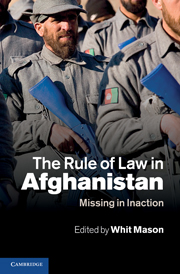Book contents
- Frontmatter
- Contents
- Contributors
- Preface and acknowledgements
- 1 Introduction
- PART I The scope and nature of the problem
- PART II The context
- PART III The political economy of opium
- PART IV Afghan approaches to security and the rule of law
- 9 Engaging traditional justice mechanisms in Afghanistan
- 10 Casualties of myopia
- 11 Land conflict in Afghanistan
- PART V International interventions
- PART VI Kandahar
- PART VII Conclusion
- Index
- References
11 - Land conflict in Afghanistan
Published online by Cambridge University Press: 01 June 2011
- Frontmatter
- Contents
- Contributors
- Preface and acknowledgements
- 1 Introduction
- PART I The scope and nature of the problem
- PART II The context
- PART III The political economy of opium
- PART IV Afghan approaches to security and the rule of law
- 9 Engaging traditional justice mechanisms in Afghanistan
- 10 Casualties of myopia
- 11 Land conflict in Afghanistan
- PART V International interventions
- PART VI Kandahar
- PART VII Conclusion
- Index
- References
Summary
For as long as anyone can remember, the main sources of conflict among Pashtuns, the ethnic group that constitutes over half of Afghanistan's population of more than 20 million, have been ‘zan, zar and zameen’ – women, treasure and land. Of these, disputes over land have come to overshadow the rest. Decades of chronic conflict, political turmoil and other civil disturbances in Afghanistan have left land administration in disarray, with the entitlements to large areas of land – and complementary water resources – subject to dispute between individuals, communities, and political, sectarian and ethnic groups.
In the politically fragile rural Afghan landscape, conflict over land and water resources has become a driver of instability. It is closely related to the persistence of insecurity and corruption, the vulnerability of the rural poor and the tenacity of the opium economy. Continuing land conflict not only threatens efforts to alleviate poverty and rehabilitate the rural economy, but also undermines the attempts of the Afghan state to stabilise insecure districts and decrease farmer participation in the opium economy. Land conflict is a symptom of the weakness of the rule of law and is itself a driver of political instability, civil unrest and corruption, so further eroding citizens' incentives to act within the law.
The first part of this discussion considers the conditions giving rise to conflict over land in Afghanistan and establishes a general typology for understanding land disputes. Using this framework, five case-study disputes are identified to test conflict resolution techniques.
- Type
- Chapter
- Information
- The Rule of Law in AfghanistanMissing in Inaction, pp. 205 - 222Publisher: Cambridge University PressPrint publication year: 2011



